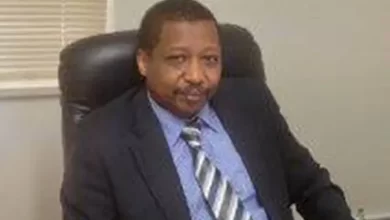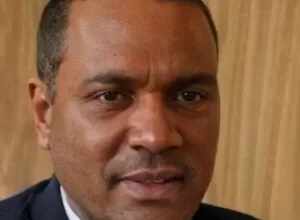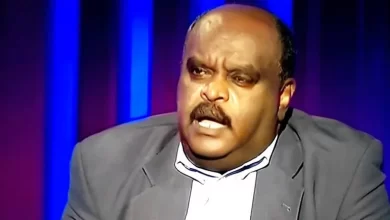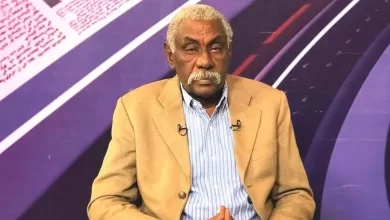Our trade won’t be profitable
Without getting upset...
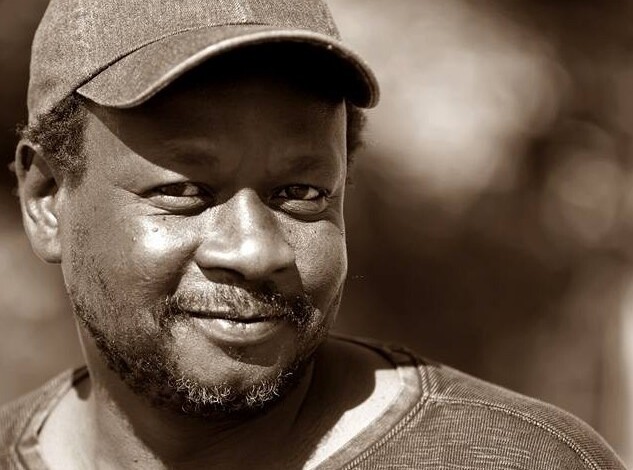
Abdul Hafeez Maryoud
I have forever contemplated, imagined, and taken a pause -in every sense of the word- when it came to the wound of Abu Amna Hamed as he sang: “My heart forgives all of your sins… Leave it alone, so its wounds can heal.” Al-Jabri is light on the soul. No annoying frivolous claims. But why do people from eastern Sudan get angry when he gets angry? Where does this intersect with the required national tranquility? Al-Jabri is from the East of Sudan as well.
The East will be patriotic -of course- when “Al-Halnaqi”, Mohammed Othman Kagray, Abu Amna Hamed write (for us), but it will be an “unwanted East” when it becomes angry. The first rule of patriotism is: “Have a seat until we call for you.”
Do you see ?
At one time I asked Professor Ahmed Elias Hussein, one of the most important masters of history: Why did they remain distanced from the media, studies, and excavations? He answered: “Simply, because Al-Khawaja didn’t direct our academics to do so…they merely follow the path drawn by Al-Khawaja”. It was Al-Khawaja who built the city of Port Sudan and made it the main port, within the framework of protecting interests.
Those interests required that the city be planned colonially, and that residents be brought in to be its “masters.” Kenneth J. Perkins in (Port Sudan: The Evolution of a Colonial City), the book that contained everything and stated what needed to be said, in addition to other books written by “Al-Khawajat.” Hence, you will find only afew people of the East on the outskirts of the city.
In October of the year 1957, more than a year after Sudan’s independence, the “Beja Congress” was the first regional political entity.
The answer to the questions of: What are the motives of the Beja intellectuals to establish a political entity, a year after independence, to express their aspirations? Why did they not find themselves in the nascent national State? Aren’t easy or acceptable answers.
As you ask such a question, you will receive a torrent of condemnation, accusations of treachery, and disgusting Castilian insults, as Márquez said. It would be appropriate and ideal if you didn’t raise the question to begin with at this time -at least- so as not to add fuel to the fire, in similar fashion to the raid incident on the television station in Port Sudan in response to the broadcaster Zainab Aira’s issue.
Do you see ?
When is the appropriate time to ask? When is it appropriate to talk about social justice, balanced development, and true partnership in running the country? Because -as always- there are “critical historical circumstances that the country is going through,” which deems it an inappropriate time, making those who stand up for their rights and the rights of their families into mere advocates of sedition…agents for others, and at best, lacking in national sensitivity.
Well then…
Based on the circumstances of the war and the the de facto government’s act of fleeing to Port Sudan, is the East actively seeking to blackmail the fleeing government ? Is it placing pressure on the government to acquire what it wouldn’t have gotten under normal circumstances ? Possibly.
But the mastermind that has been running the country, since the dawn of independence, is viewing the East the same way employees and workers view the teller counter – before electronic salary payment was implemented. The teller’s window was a semi-sacred place. Governments view the ports in the East as exchange windows. It exports products through it, and receives imports that cross the East to where the elites reside. You cannot remember a single national agricultural project in the East… no factories… or foreign investments being settled in the East so that people can enjoy its bounties… almost nothing.
It is very important to note that the act of sowing discord occurs according to a Central scheme. The differences between the “Hadendoa” and “Beni-Amer” must be realized. As well as between the “Beni-Amer” and “Nuba”, between the “Rashaida” and “Halfawi”, for example.
But the most prominent and clear aspect is establishing that the “Beni-Amer” and “Habab” are both Eritrean tribes. The “Rashaida” are immigrants. In contrast to “indigenous” people, and those are the “Hadendoa” tribes. When the situation gets tough, we have to keep the East busy with arbitrary divisions. The “Hadendoa” wins against “Beni-Amer” and “Habab”, for example. Imaginary conflicts are being fueled to distract the East from its own issues.
Currently, there is an existential war that threatens the “State’s entity.” A war waged by “The Rapid Support Forces backend by mercenaries and well-known countries,” and the East must “be responsible, unite (with us), to confront the common enemy… Then after we eliminate it, we can return to (addressing) the problems of the East.”
Do you see ?
The confusing pronoun (we)…to whom does it refer?!
“We did for you.” … “We gave you.” …. “We will handle it for you.”
Naturally, the question isn’t an essential one. Why? Because it’s baseless on… How is that? As long as there is a “we,” as opposed to a “them,” and a “you,” it is necessary to define this “we.” At least, so that we can “fight” “with you,” and after the war we will wait for you to “address” our problems for us..
The sentence -in terms of construction- makes the rest (others)… the basis of South Sudan’s rebellion problems in 1955, to the war with the Rapid Support Forces, and with the Movements of Darfur, the Nuba Mountains, the Blue Nile, and eastern Sudan… which of the four regions of Sudan didn’t “rebel,” and why?
Do you see ?
Most importantly:
The delicate heart lives in doubt more than certainty
A hurtful look commands its attention, and burns with love for a long time
As Abu Amna Hamed said

